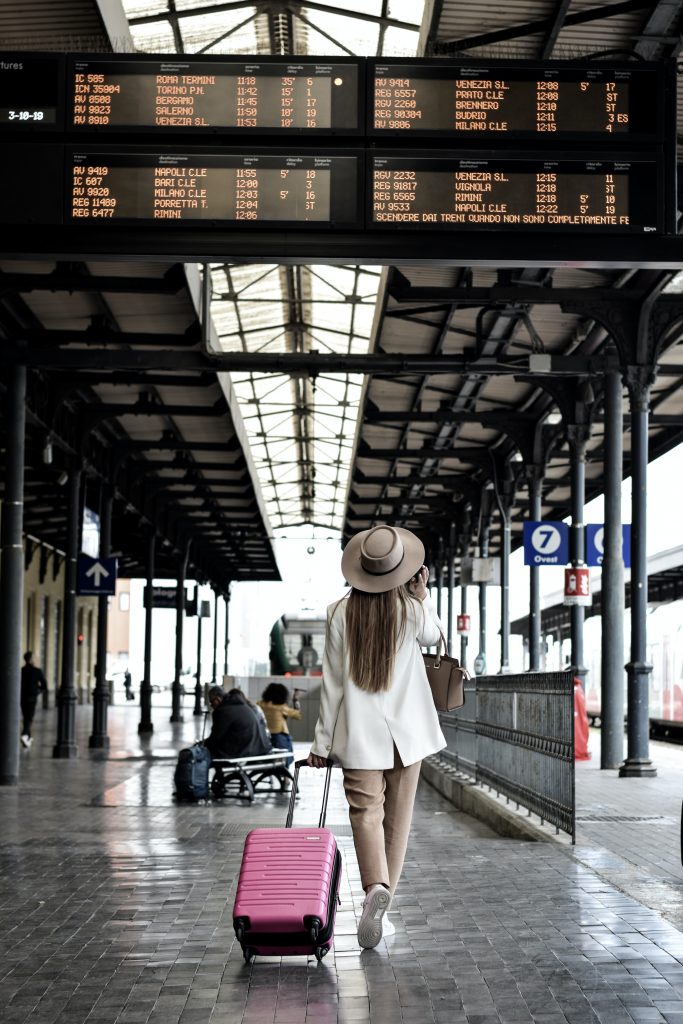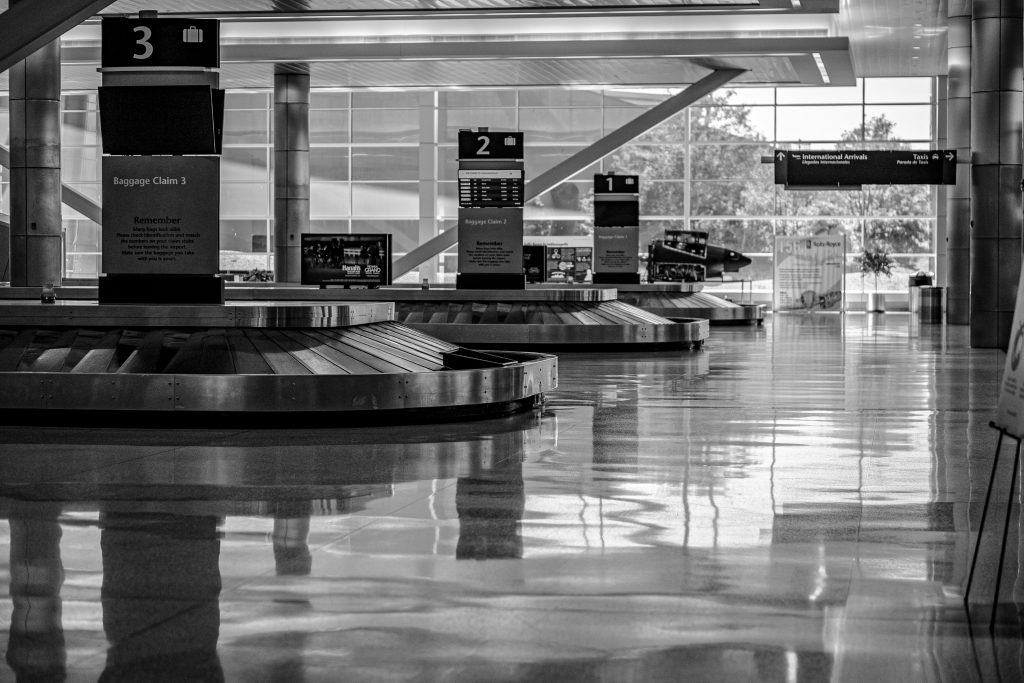
Travel Delays and Cancellations: How to Handle Them?
Last month was perhaps the worst travel month of 2022. With Southwest and many other airlines experiencing massive cancellations, many were left struggling. However, don’t fret! Read our blog to learn more about your entitlements, and right, and how to navigate travel inconveniences.
Table of Contents
Delays and Cancellations
Dealing with flight delays can be very frustrating. If you experience a delay make sure that you follow the following steps to stay calm.
Travel Insurance

Travel insurance is a plan you purchase that protects you from certain financial risks and losses that can occur while traveling. These losses can be minor, like a delayed suitcase, or significant. For example, a last-minute trip cancellation or a medical emergency overseas.
In addition to financial protection, the other huge benefit of travel insurance is access to assistance services. Our elite team of travel and medical experts can arrange medical treatment in an emergency, monitor your care, serve as interpreters, help you replace lost passports. Sometimes, they even save travelers’ lives.
A few things you should know about travel insurance:
- Benefits vary by plan. It’s important to choose a plan that fits your needs, your budget and your travel plans. Here are definitions of all available travel insurance benefits.
- Insurance can’t cover every possible situation. It covers only the specific situations, events, and losses included in your plan documents, and only under the conditions we describe.
- Travel insurance is designed to cover unforeseeable events— not things you could easily see coming, or things within your control. If, for example, you wait to buy insurance for your beach trip until after a named hurricane is hustling toward your destination, your losses wouldn’t be covered.
How Does Travel Insurance Work?
In most scenarios, travel insurance reimburses you for covered financial losses after you file a claim and you have approval. Filing a claim means submitting proof of your loss so that insurance can verify what happened and reimburse you for your covered losses. You can file a claim online, or do it on your phone with our free TravelSmart app.
How does this work in real life? Let’s say you purchase the insurance which includes trip cancellation benefits, to protect your upcoming cruise to Cozumel. Two days before departure, you experience a high fever and chest pain. Your doctor diagnoses bacterial pneumonia and advises you to cancel the trip. When you notify the cruise line, they tell you it’s too late to receive a refund. However, you would file a claim and receive a refund under travel insurance.
Other Considerations

Without travel insurance, you’d lose the money you spent on your vacation. Fortunately, a serious, disabling illness can be considered a covered reason for trip cancellation. You can be reimbursed for prepaid, nonrefundable trip costs. Once you’re feeling better, gather the required documents — such as your airfare and cruise line receipts file a claim. You can even choose to receive your reimbursement via direct deposit, to your debit card or check.
Sometimes, this process works a little differently. Travel insurance may pay your expenses up front if you require emergency medical treatment or emergency transportation while traveling overseas. No receipts for purchases are required; all you need is proof of your covered delay.
Recommended Travel Insurance Companies
Allianz
Allianz Travel Insurance provides a selection of 10 travel insurance plans intended to suit different traveler needs. You can purchase coverage for a specific trip. Allianz also offers annual travel insurance plan if you travel often and want to avoid buying a new travel insurance policy each time.
When it comes to purchasing travel insurance for a specific trip, Allianz offers several levels of coverage. While each plan comes with its own inclusions and coverage limits, its most popular single-trip option is the OneTrip Prime plan.
With OneTrip Prime, you can receive trip cancellation coverage up to $100,000, trip interruption coverage. Up to $150,000, emergency medical coverage for $50,000. And up to $1,000 in baggage loss, theft or damage, and up to $800 in travel delay coverage, among other benefits.
Travelex Insurance Services
Travelex offers two main travel insurance plans – Travel Basic and Travel Select. The company offers a U.S.-specific Travel America plan as well. Plus, Travelex also lets you tailor your policy to meet your unique needs with optional add-ons.
If you’re looking for an affordable plan, you should consider the company’s Travel Basic plan. This plan covers 100% of the insured trip cost for cancellations and interruptions and up to $500 for trip delays. It also offers up to $100,000 in emergency medical evacuation and repatriation coverage. Travelex offers $15,000 in emergency medical and dental coverage. Finally, it covers up to $500 in coverage for lost, damaged or stolen baggage and personal effects. Plus, you have access to primary coverage with no deductibles. The company recommends this plan for short, domestic vacations.
World Nomads Travel Insurance
World Nomads sells customizable travel insurance policies that vary in terms of coverage and price based on your needs. Its policy inclusions are broad. In contrast to other travel insurance companies, it covers adventure sports, such as scuba diving, mountain biking, etc.
Generally speaking, you’ll have the choice between two travel insurance plans . A standard plan or an Explorer Plan – when you apply for a free quote from World Nomads. The Standard Plan provides a lower level of coverage for a more affordable upfront cost. Whereas the Explorer Plan offers more robust coverage for a higher premium.
For example, the Standard Plan only offers $2,500 in trip protection coverage, while the Explorer Plan promises $10,000. Both plans provide $100,000 in emergency medical coverage. But the Standard Plan assures $300,000 in emergency evacuation coverage, whereas the Explorer Plan offers $500,000 worth of coverage.
AIG Travel
AIG Travel offers three types of travel insurance plans. The Annual plan for all trips in a one-year span,the Pack N’ Go plan for last-minute trips. There is also the single package which has three levels. You can insure your trips with essential, preferred or deluxe level coverage. Depending on the cost of your trip and the amount of reimbursement you want to be guaranteed.
The amount of coverage and the limits in your plan can vary depending on your trip details. This variability makes it essential to obtain a quote through the AIG Travel search engine to verify the coverage levels you can qualify for.
AIG Travel insurance plans generally cover kids 17 and younger. With a mid-tier Preferred plan, you may qualify for trip cancellation coverage for up to 100% of your trip’s cost (maximum of $150,000) and trip interruption coverage for up to 150% of your trip’s cost (maximum of $225,000). Medical expense coverage can be worth up to $50,000 depending on your trip details, and trip delay coverage worth up to $800 can be included as well.
Passenger Rights
Knowing your passenger rights can result in receiving a refund. Make sure that you are familiar with your passenger rights.

Guidelines from the Department of Transportation
Airlines don’t guarantee their schedules, and you should realize this when planning your trip. There are many things that can-and often do-make it impossible for flights to arrive on time. Some of these problems, like bad weather, air traffic delays, and mechanical issues, are hard to predict and often beyond the airlines’ control.
Delays
If your flight is delayed, try to find out how late it will be. But keep in mind that it is sometimes difficult for airlines to estimate the total duration of a delay . Weather forecasts predicted to improve can instead deteriorate. Mechanical problems can turn out to be more complex than initially evaluated.
If the problem is with local weather or air traffic control, all flights will probably be late. In this case there’s not much you or the airline can do to speed up your departure. If your flight is experiencing a lengthy delay, you might be better off trying to arrange another flight. As long as you don’t have to pay a cancellation penalty or higher fare for changing your reservations, it is sometimes easier. If you find a flight on another airline, ask the first airline if it will endorse your ticket to the new carrier; this could save you a fare collection. Remember, however, that there is no rule requiring them to do this.
Cancellations
If your flight is canceled, most airlines will rebook you on their first flight to your destination at no additional charge. If this involves a significant delay, find out if another carrier has space and ask the first airline if they will endorse your ticket to the other carrier. Finding extra seats may be difficult, however, especially over holidays and other peak travel times.
Variance in Airlines
Each airline has its own policies about what it will do for delayed passengers waiting at the airport; there are no federal requirements. If you are delayed, ask the airline staff if they will pay for meals . Some airlines, often those charging very low fares, do not provide any amenities to stranded passengers. Others may not offer amenities if the delay is caused by bad weather or something beyond the airline’s control. Contrary to popular belief, domestic itineraries airlines are not required to compensate passengers whose flights are delayed or canceled.
Compensation is required by law on domestic trips only when you are “bumped” from a flight that is oversold. On international itineraries, passengers may be able to recover reimbursement under Article 19 of the Montreal Convention for expenses resulting from a delayed or canceled flight by filing a claim with the airline. If the claim is denied, you may pursue the matter in court.
Problems Due to Overbooking
Overbooking is not illegal. Most airlines overbook their scheduled flight to compensate for “no-shows.” Passengers are sometimes left behind or “bumped” as a result. When an oversale occurs, the Department of Transportation (DOT) requires airlines to ask people who aren’t in a hurry to give up their seats voluntarily, in exchange for compensation. Those passengers bumped against their will are, with a few exceptions, entitled to compensation.
Involuntary Bumping
DOT requires each airline to give all passengers who are bumped involuntarily a written statement. THe statement describes their rights and explaining how the carrier decides who gets on an oversold flight and who doesn’t. Those travelers who don’t get to fly are frequently entitled to denied boarding compensation in the form of a check or cash. The minimum amount depends on the price of the traveler’s ticket and the length of the delay. DOT’s requirements are the minimum but airlines may choose to provide a higher amount.
What to do if bumped
- If you are bumped involuntarily and the airline arranges substitute transportation that is scheduled to get you to your final destination (including later connections) within one hour of your original scheduled arrival time, there is no compensation.
- If the airline arranges substitute transportation that is scheduled to arrive at your destination between one and two hours after your original arrival time (between one and four hours on international flights), the airline must pay you, at a minimum, an amount equal to 200% of your one-way fare to your final destination that day, or $775, whichever amount is lower.
- If the substitute transportation is scheduled to get you to your destination more than two hours later (four hours internationally), or if the airline does not make any substitute travel arrangements for you, the minimum compensation doubles (400% of your one-way fare, or $1,550, whichever amount is lower).
- If your ticket does not show a fare (for example, a frequent-flyer award ticket or a ticket issued by a consolidator), your denied boarding compensation is based on the lowest cash, check or credit card payment charged for a ticket in the same class of service (e.g., coach, first class) on that flight.
- You always get to keep your original ticket and use it on another flight. If you choose to make your own arrangements, you can request an “involuntary refund” for the ticket for the flight you were bumped from. The denied boarding compensation is essentially a payment for your inconvenience.
- If you paid for optional services on your original flight (e.g., seat selection, checked baggage) and you did not receive those services on your substitute flight or were required to pay a second time, the airline that bumped you must refund those payments to you.
Baggage

Part of your passenger rights also include your bags. If you have damage, delayed or lost bags, you may be entitled to compensation
Damage
If your suitcase arrives smashed or torn, the airline will usually pay for repairs. If it can’t be fixed, they will negotiate a settlement to pay you its depreciated value. The same holds true for belongings packed inside. Airlines may decline to pay for damage caused by the fragile nature of the broken item or inadequate packing, rather than the airline’s rough handling.
Air carriers might also refuse to compensate you for damaged items. This is b inside the bag when there’s no evidence of external damage to the suitcase. When you check in, airline personnel may let you know if they think your suitcase or package may not survive the trip intact. Before accepting a questionable item, they may ask you to sign a statement in which you agree to check it at your own risk. But even if you do sign this form, the airline might be liable for damage if caused by its own negligence shown by external injury to the suitcase or package.
Delayed Bags

If you and your suitcase don’t connect at your destination, don’t panic. The airlines have very sophisticated systems that track down the vast majority of misplaced bags and return them to their owners within hours. In many cases they will absorb reasonable expenses you incur while they look for your missing belongings. You and the airline may have different ideas of what’s reasonable, however, and the amount it will pay is subject to negotiation.
If your bags don’t come off the conveyor belt, report this to airline personnel before you leave the airport. Insist that they create a report and give you a copy, even if they say the bag will be in on the next flight. Get an appropriate phone number for following up (not the Reservations number). Don’t assume that the airline will deliver the bag without charge when it is found; ask the airline about this. Most carriers set guidelines for their airport employees that allow them to disburse some money at the airport for emergency purchases.
The amount depends on whether or not you’re away from home and how long it takes to track down your bags. If the airline does not provide you a cash advance, it may still reimburse you later for the purchases. Discuss with the carrier the types of articles that would be reimbursable, and keep all receipts. If the airline misplaces sporting equipment, it will sometimes pay for the rental of replacements. For replacement clothing or other articles, the carrier might offer to absorb only a portion of the purchase cost. This is on the basis that you will be able to use the new items in the future. (The airline may agree to a higher reimbursement if you turn the articles over to them.)
Lost Luggage
Once your bag is declared (permanently) lost, you will have to submit a claim. This usually means you have to fill out a second, more detailed form. Check on this; failure to complete the second form when required could delay your claim. Missing the deadline for filing it could invalidate your claim altogether.
The airline will usually refer your claim to a central office. The negotiations between you and the airline will begin. If your flight was a connection involving two carriers, the final carrier is normally the one responsible for processing your claim. Even if it appears that the first airline lost the bag. Airlines don’t automatically pay the full amount of every claim they receive.
First, they will use the information on your form to estimate the value of your lost belongings. Like insurance companies, airlines consider the depreciated value of your possessions, not their original price or the replacement costs. If you’re tempted to exaggerate your claim, don’t. Airlines may completely deny claims they feel are inflated or fraudulent. They often ask for sales receipts and other documentation to back up claims, especially if a large amount of money is involved.
If you don’t keep extensive records, you can expect to negotiate with the airline over the value of your goods. Generally, it takes an airline anywhere from four weeks to three months to pay passengers for their lost luggage. When airlines tender a settlement, they may offer you the option of free tickets on future flights in a higher amount than the cash payment. Ask about all restrictions on these tickets, such as “blackout” periods.
Domestic and International Contracts on Tickets
For domestic travel, an airline may provide all of its contract terms on or with your ticket at the time you buy it. Some small “commuter” carriers use this system. Other airlines may elect to “incorporate terms by reference.” This means that you are not given all the airline’s rules with your ticket. Most of them are contained in a separate document which you can inspect on request or on the airline’s web site. If an airline elects to “incorporate by reference” it must provide conspicuous written notice with each ticket that. They must 1) it incorporates terms by reference, and 2) these terms may include liability limitations, claim-filing deadlines, check-in deadlines, and certain other key terms. The airline must also:
- Ensure that passengers can receive an explanation of key terms identified on the ticket from any location where the carrier’s tickets are sold, including travel agencies;
- Make available for inspection the full text of its contract of carriage at each of its own airport and city ticket offices;
- Mail a free copy of the full text of its contract of carriage upon request.
DOT also requires most U.S. airlines to post their contracts of carriage on their web site, if they have on
International
Not all of the detailed requirements for disclosing domestic contract terms apply to international travel. Where they do not, the airline must keep a copy of its “tariff” rules at its airport and city ticket offices. On flights to or from the U.S., you have a right to examine these rules.
The most important point to remember, whether your travel is domestic or international, is that you should not be afraid to ask questions about a carrier’s rules. You have a right to know the terms of your contract of carriage. It is in your best interest, as well as that of the airline, for you to ask in advance about any matters of uncertainty.
